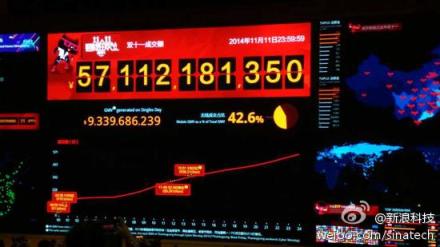What Retailers Can Take Away From Singles’ Day Binge
The two most noteworthy recent events in China are obviously the APEC Summit and the Singles’ Day shopping festival. Since its creation five years ago, Singles’ Day has become the online shopping feast that almost every Chinese consumer expects.
The shopping event was created by Alibaba in 2009 as a promotion to drive sales on Tmall and Taobao on the November 11 Singles’ Day holiday. Alibaba uses the event to reward consumers and reinforce its eCommerce influence in the Chinese market. Now the most influential eCommerce event in China, Singles’ Day is no longer Alibaba’s monopoly — almost all e-tailers and even offline retailers are getting involved.
Compared with past years, the Singles’ Day 2014 campaign has several new features:
- Global reach. Top eCommerce players such as Alibaba, Amazon, Jingdong, and Suning have all announced “globalization” plans and activities around this year’s event; these plans include offering a broad selection of discounted products, preferential tax rates, free or low-cost international shipping, and speedy delivery.
- Big data. According to Alizila, Alibaba will apply predictive analysis to Tmall transaction data to project order volume. The Cainiao smart logistics network and its delivery partners can use this information to allocate resources and respond to demand more precisely.
- Interactions between online and offline. To expand the impact of online retail to offline businesses, Alibaba conducted offline-to-online promotional activities for home renovation and home decoration projects. It also rallied more than 300 department stores in 18 cities to join the event by offering special discounts to shoppers who buy store-value cards online and use them to redeem goods in physical stores.

Source: weibo.com/Sinatech
Merchants from 217 countries and regions concluded transactions on Tmall’s platform this year, generating 278 million orders and pushing total transaction volume to RMB 57.1 billion ($9.3 billion) — a new Singles’ Day record for transactions.
The rapid growth of online retail sales is fundamentally changing China’s retail industry. Online retail has become the main driver of increasing consumption expenditures rather than a complementary channel — meaning that eCommerce is now driving the digital transformation of traditional retailers.
While the Singles’ Day shopping festival helps retailers achieve outstanding sales volume increases in a short period of time, they should instead think about the long term — how to increase margins and create loyal customers that generate lasting value rather than a temporary bump in the number of orders or one-time customers. Retailers should collect and manage the new customer information that these promotional activities generate and develop ways to obtain ongoing value from these new customers. Finally, the fact that China’s top eCommerce players all launched globalization strategies for Singles’ Day 2014 to test new business models indicates that retailers inside and outside of China will have opportunities to leverage these players’ platforms to increase brand awareness, enter new markets and gain access to new customers.
To learn more about trends in China’s retail market, please stay tuned for my “China’s Retail Market Landscape In 2014” report, which is coming soon.